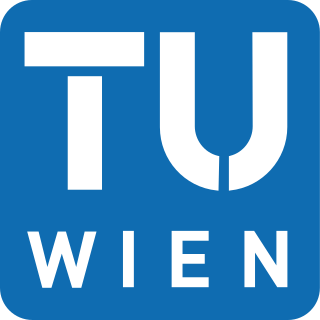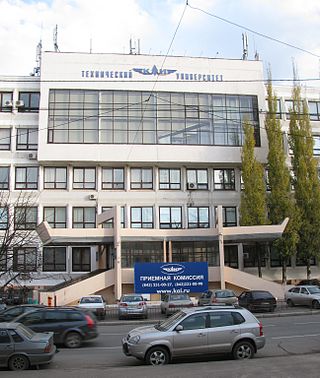
The Technische HochschuleMittelhessen University of Applied Sciences is a German Fachhochschule for bachelor's and master's studies in the cities of Giessen, Friedberg, and Wetzlar.

Technische Universität Berlin is a public research university located in Berlin, Germany. It was the first German university to adopt the name "Technische Universität".

The Technical University of Munich is a public research university in Munich, Bavaria, Germany. It specializes in engineering, technology, medicine, and applied and natural sciences.

Leibniz University Hannover, also known as the University of Hannover, is a public research university located in Hanover, Germany. Founded on 2 May 1831 as Higher Vocational School, the university has undergone six periods of renaming, its most recent in 2006.
TU Dresden, also as the Dresden University of Technology, is a public research university in Dresden, Germany. It is the largest institute of higher education in the city of Dresden, the largest university in Saxony and one of the 10 largest universities in Germany with 32,389 students as of 2018.

Graz University of Technology is a public research university located in Styria, Austria. It was founded in 1811 by Archduke John of Austria and is the oldest science and technology research and educational institute in Austria. It currently comprises seven faculties and is a public university. It offers 19 bachelor's and 36 master's study programmes across all technology and natural sciences disciplines. Doctoral training is organised in 14 English-speaking doctoral schools. The university has more than 17,000 students, and around 1,900 students graduate every year. The Graz University of Technology and the University of Graz co-operate in teaching and research of natural sciences.

The Vienna University of Technology is a public research university in Vienna, Austria.

The Technische Universität Darmstadt, commonly known as TU Darmstadt, is a research university in the city of Darmstadt, Germany. It was founded in 1877 and received the right to award doctorates in 1899. In 1882, it was the first university in the world to set up a chair in electrical engineering. In 1883, the university founded the first faculty of electrical engineering and introduced the world's first degree course in electrical engineering. In 2004, it became the first German university to be declared as an autonomous university. TU Darmstadt has assumed a pioneering role in Germany. Computer science, electrical engineering, artificial intelligence, mechatronics, business informatics, political science and many more courses were introduced as scientific disciplines in Germany by Darmstadt faculty.

The Technical University of Braunschweig, commonly referred to as TU Braunschweig, is the oldest Technische Universität in Germany. It was founded in 1745 as Collegium Carolinum and is a member of TU9, an incorporated society of the most renowned and largest German institutes of technology. It is commonly ranked among the top universities for engineering in Germany. TU Braunschweig's research profile is very interdisciplinary, but with a focus on aeronautics, vehicle engineering including autonomous driving and electric mobility, manufacturing, life sciences, and metrology. Research is conducted in close collaboration with external organizations such as the German Aerospace Center (DLR), Helmholtz Centre for Infection Research, several Fraunhofer Institutes, and Germany's national metrology institute (PTB), among many others. As one of very few research institutions of its type in the world, the university has its own research airport.
The Hamburg University of Technology is a research university in Germany. The university was founded in 1978 and in 1982/83 lecturing followed. Around 100 senior lecturers/professors and 1,475 members of staff work at the TUHH.

TU Dortmund University is a technical university in Dortmund, North Rhine-Westphalia, Germany with over 35,000 students, and over 6,000 staff including 300 professors, offering around 80 Bachelor's and master's degree programs. It is situated in the Ruhr area, the fourth largest urban area in Europe. The university pioneered the Internet in Germany, and contributed to machine learning.

The National Polytechnic University of Armenia is a technical university located in Yerevan, Armenia. Established as the Karl Marx Institute of Polytechnic in 1933, it provides educational and research programs in various fields of technology and science related to engineering. The university includes a central campus in Yerevan and branch campuses located in Gyumri, Vanadzor and Kapan. Currently there are more than 8,000 students and more than 750 faculty members.

The Clausthal University of Technology is an institute of technology in Clausthal-Zellerfeld, Lower Saxony, Germany. The small public university is regularly ranked among the Top German universities in engineering by CHE University Rankings. More than 30% of students and 20% of academic staff come from abroad, making it one of the most international universities in Germany. The university is best known for the prominent corporate leaders among its former students.

Technical University of Kaiserslautern was a public research university in Kaiserslautern, Germany.

The Karlsruhe Institute of Technology is both a German public research university in Karlsruhe, Baden-Württemberg, and a research center of the Helmholtz Association.

The Kazan National Research Technical University was established in 1932. Until recently, it was known as Kazan Aviation Institute. In 1973, the institute was named after Andrei Nikolayevich Tupolev, the aircraft designer. In 1992, it got the status of State Technical University. The Kazan National Research Technical University teaches about 25,000 students on 65 majors in Engineering, Business and Humanitarian Sciences by the university faculty body of 1,800 persons, including 150 Full Professors & Doctor of Science degree holders, 600 Associate Professors & Ph.D. degree holders.

The Technical University of Applied Sciences Würzburg-Schweinfurt is a technical university in Germany, which was founded originally in 1807, and was restructured during 1971. The university is among the applied sciences universities in Germany with over 150 partner universities worldwide. The university is located in Bavaria with campuses in Würzburg and Schweinfurt.
Technische Hochschule „Carl Schorlemmer“ Leuna-Merseburg, abbreviated: THLM was an institution of tertiary education in the city of Merseburg in today's Saxony-Anhalt, Germany. It was founded on 1 September 1954 as Technische Hochschule für Chemie Leuna-Merseburg (THC) and closed on 31 March 1993. Hochschule Merseburg was founded on the grounds of THLM in 1992.
The Department of Electrical Engineering and Information Technology (etit) is a department of the Technische Universität Darmstadt. It was the first faculty of electrical engineering in the world and offered the first course of study in electrical engineering.

The Department of Computer Science is a department of the Technische Universität Darmstadt. With a total of 36 professorships and about 3,700 students in 12 study courses, the Department of Computer Science is the largest department of the university. The department shapes the two research profile areas "Cybersecurity (CYSEC)" and "Internet and Digitization (InDi)" of the university.



















